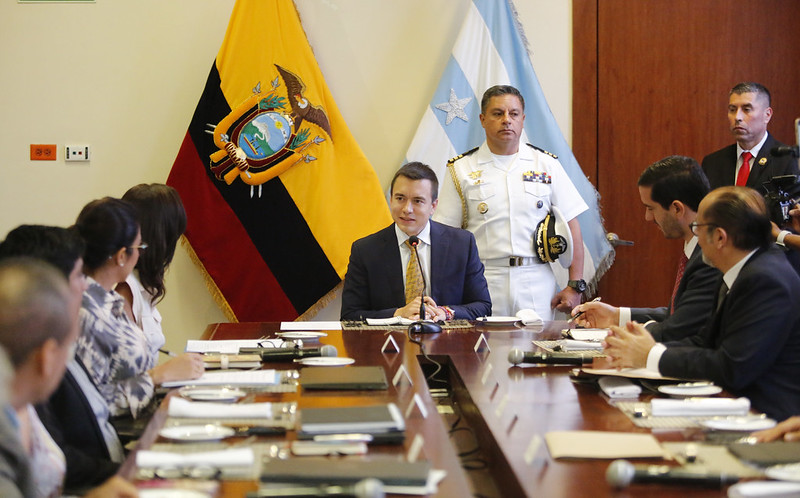
Noboa, the youngest president in Ecuador’s history, faces a crisis of insecurity.
“President Daniel Noboa issued…an executive decree that reforms the current state of emergency and recognizes the existence of an ‘internal armed conflict.’”
Ecuador has been reeling from a dramatic increase in homicides over the past four years as gangs have evolved into transnational criminal organizations linked to Mexico’s drug cartels.[i]. The country’s homicide rate rose from 6.7 per 100,000 citizens in 2019 to an estimated 45 per 100,000 in 2023.[ii] In a recent 48-hour period, two notorious gang leaders escaped prison, gangs laid siege to the University of Guayaquil, and one group stormed a live news broadcast, televising the bedlam for nearly 20 minutes before cutting the transmission, reports center-left Argentine news outlet Clarín. In response to this spate of violence, the recently elected Noboa government declared a state of emergency. However, the continued threat posed by multiple criminal groups has led Noboa to dramatically increase the sense of urgency, declaring instead an “internal armed conflict.” This empowered the nation’s armed forces to enforce a 60-day curfew and restore domestic security, according to Ecuadorian digital news outlet Primicias. The decree enumerated nearly two dozen armed groups and classified them as domestic terrorist organizations, the outlet says. Noboa is only a few months into his term, following a presidential campaign that featured the assassination at the hands of criminal groups of Fernando Villavicencio, a popular anticorruption candidate.[iii] To complement his presidential decree, Noboa announced a package of increased measures, including the construction of additional maximum-security prisons and the expropriation of criminal assets. The effectiveness of these measures bears watching throughout 2024 to see if Ecuador follows down a similar path as El Salvador or continues to spiral down into criminality and violence.
Sources:
“Súplicas de ‘no me maten’ y una granada en el bolsillo: así tomó en vivo un grupo narco el canal de televisión en Ecuador (Pleas of ‘don’t kill me’ and a grenade in the pocket: this is how a drug group took over a television channel in Ecuador live),” Clarín (Argentina’s oldest outlet that is generally considered center left), 9 January 2024. https://www.clarin.com/mundo/grupo-armado-irrumpio-transmision-vivo-canal-television-ecuador_0_0okSuT5tJC.html
An armed group stormed the live broadcast of a television channel in Ecuador, threatening those who were in charge of the programming with guns and weapons of war. There were also violent episodes at the University of Guayaquil and on commercial premises…the security forces stated only two hours after the assault that they were able to recover the taken buildings.
“Noboa declara conflicto armado interno y dispone la salida de militares (Noboa declares internal armed conflict and orders the departure of soldiers),” Primicias (a digital news outlet based in the capital, Quito) 9 January 2024. https://www.primicias.ec/noticias/politica/noboa-conflicto-armado-interno-militares/President Daniel Noboa issued…an executive decree that reforms the current state of emergency and recognizes the existence of an ‘internal armed conflict.’ Therefore, it provides for the immediate mobilization and intervention of the Armed Forces and the Police in the national territory. The decree was issued minutes after armed attackers took over the TC Television facilities and broadcast live. This new decree establishes the identification of…organized crime groups as ‘terrorist organizations and belligerent non-state actors.’
Notes:
[i] Previous governments, unable to stem the growth in criminal potency, have issued pleas to the international community for a “Plan Ecuador,” akin to the wide-ranging security assistance plan and social makeover that helped save Colombia from similar threats in the 1990s and 2000s. For more information, see: Ryan Berg “President Lasso Calls for ‘Plan Ecuador’ Amid Growing Security Concerns,” OE Watch, 12-2021. https://community.apan.org/cfs-file/__key/telligent-evolution-components-attachments/13-21393-00-00-00-40-08-49/2021_2D00_12_2D00_01-President-Lasso-Calls-for-_1C20_Plan-Ecuador_1D20_-Amid-_2800_Berg_2900_.pdf?forcedownload=true
[ii] For more information on rising homicide figures in Ecuador, see: “How Ecuador Became Latin America’s Deadliest Country,” The Economist, 10 January 2024. https://www.economist.com/the-americas/2024/01/10/how-ecuador-became-latin-americas-deadliest-country
[iii] For more on Villavicencio, see: Ryan Berg, “Presidential Candidate Assassination Shows New Depths of Ecuador’s Insecurity,” OE Watch, 09-2023. https://fmso.tradoc.army.mil/2023/presidential-candidate-assassination-shows-new-depths-of-ecuadors-insecurity/
Image Information:
Image: Noboa, the youngest president in Ecuador’s history, faces a crisis of insecurity. Source: https://www.flickr.com/photos/presidenciaecuador/53367780040/
Attribution: Flickr, PDM 1.0 DEED

